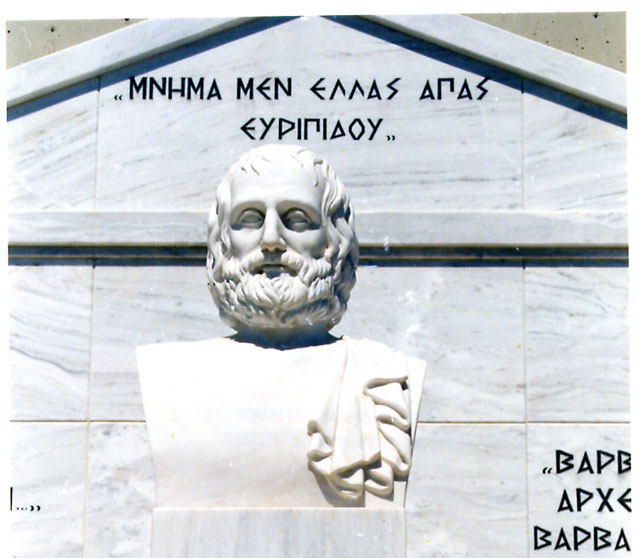
According to legend, Euripides was born in Salamís on 23 September 480 BCE, the day of the Persian War’s greatest naval battle. Other sources estimate that he was born as early as 485 BCE.
His father’s name was either Mnesarchus or Mnesarchides and his mother’s name Cleito.[2] Evidence suggests that the family was wealthy and influential. It is recorded that he served as a cup-bearer for Apollo’s dancers, but he grew to question the religion he grew up with, exposed as he was to thinkers such as Protagoras, Socrates, and Anaxagoras.
He was married twice, to Choerile and Melito, though sources disagree as to which woman he married first.[3] He had three sons and it is rumored that he also had a daughter who was killed after a rabid dog attacked her (some say this was merely a joke made by Aristophanes, who often poked fun at Euripides). The record of Euripides’ public life, other than his involvement in dramatic competitions, is almost non-existent. The only reliable story of note is one by Aristotle about Euripides’ involvement in a dispute over a liturgy (an account that offers strong evidence that Euripides was a wealthy man). It has been said that he travelled to Syracuse, Sicily; that he engaged in various public or political activities during his lifetime; that he wrote his tragedies in a sanctuary, The Cave of Euripides on Salamis Island; and that he left Athens at the invitation of King Archelaus I of Macedon and stayed with him in Macedonia and allegedly died there in 408 B.C.; being accidentally attacked by the kings hunting dogs while walking in the woods. According to Pausanias, Euripides was buried in Macedonia.
Euripides first competed in the City Dionysia, the famous Athenian dramatic festival, in 455 BCE, one year after the death of Aeschylus. He came third, reportedly because he refused to cater to the fancies of the judges. It was not until 441 BCE that he won first prize and over the course of his lifetime Euripides claimed only four victories. He also won a posthumous victory.
He was a frequent target of Aristophanes’ humour. He appears as a character in The Acharnians, Thesmophoriazusae, and most memorably in The Frogs (where Dionysus travels to Hades to bring Euripides back from the dead; after a competition of poetry, the god opts to bring Aeschylus instead).
Euripides’ final competition in Athens was in 408 BCE; there is a story that he left Athens embittered over his defeats. He accepted an invitation by the king of Macedon in 408 or 407 BCE, and once there he wrote Archelaus in honour of his host. He is believed to have died there in winter 407/6 BCE; ancient biographers have told many stories about his death, but the simple truth was that it was probably his first exposure to the harsh Macedonia winter which killed him.[4] The Bacchae was performed after his death in 405 BCE and won first prize.
In comparison with Aeschylus (who won thirteen times) and Sophocles (who had eighteen victories) Euripides was the least honoured of the three—at least in his lifetime. Later in the 4th century BCE, Euripides’ plays became the most popular, largely because of the simplicity of their language.[citation needed] His works influenced New Comedy and Roman drama, and were later idolized by the French classicists; his influence on drama extends to modern times.
Euripides’ greatest works include Alcestis, Medea, Trojan Women, and The Bacchae. Also considered notable is Cyclops, the only complete satyr play to have survived.
While the seven plays of Aeschylus and Sophocles that have survived were those considered their best, the manuscript containing Euripides’ plays was part of a multiple volume, alphabetically-arranged collection of Euripides’ works, rediscovered after lying in a monastic collection for approximately 800 years. The manuscript contains those plays whose (Greek) titles begin with the letters E to K. This accounts for the large number of extant plays of Euripides (among ancient dramatists, only Plautus has more surviving plays), the survival of a satyr play, and the absence of a trilogy. It is a testament to the quality of Euripides’ plays that, though their survival was dependent on the letter their title began with and not (as with Aeschylus and Sophocles) their quality, they are ranked alongside and often above the plays of Aeschylus and Sophocles.


